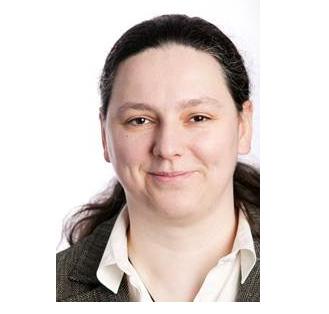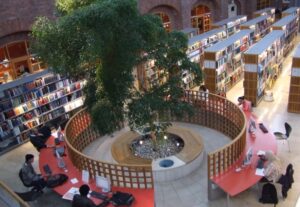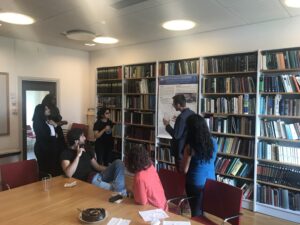Dr. Ilona Kretzschmar, chair of the Department of Chemical Engineering at the Grove School of Engineering, is a staunch believer in the benefits of international collaborations.
When Dr. Kretzschmar was studying chemistry as an undergraduate at The Technical University of Berlin in Germany, she participated in a study abroad program and spent time at Dublin City University in Dublin, Ireland, where she continued to study chemistry and earned a year’s worth of transfer credits. She had never done anything like it before, and the experience left an indelible impression on her.
“My time in Dublin made me realize how different cultures can be,” she said, “And how similar they can be, like two sides of a coin.”
After completing her undergraduate degree, she stayed at the Technical University of Berlin to begin her Ph.D. in the laboratory of Prof. Helmut Schwarz with a focus on gas-phase mass spectrometry. She eventually earned a Diploma of Chemistry, summa cum laude. Spurred on by both her positive experiences and newly gained confidence in the study abroad program, she performed research twice in the United States for three months in Prof. Peter Armentrout’s group at the University of Utah gaining valuable research data toward her Ph.D. degree. She loved the cities she visited, such as Boston and Cambridge, and ended up going to the US for her postdoc staying for years, first working first at Harvard and then at Yale pursuing surface science and then molecular electronics in electrical engineering work. When looking for faculty positions, she discovered City College, and fell in love with the campus and working with students.
“City College is just a great place to work at. Work with a student for five minutes, and you can change their lives.”
As she began working at City College as an Assistant Professor, a colleague reached out from the Royal Institute of Technology (KTH) in Stockholm, Sweden. A student from the student-led Chemical US Travel (CHUST) program at KTH was interested in her research and wanted to travel to NYC to work with her on a project for the summer.
This initial contact became the seed for the program that would become the International Research Experience for Students program (IRES), which exchanged students between CCNY and the KTH-Royal Institute of Technology and ran uninterrupted from 2007 to 2019.
The KTH is a leading technical university in Sweden, with a focus on applied technology. Dr. Kretzschmar recognized the similarities between the Swedish institution and CCNY, such as their focus on working-class students, and saw that they would be good fits for each other.
Kretzschmar secured an NSF CAREER award in 2007 for her research on Molecularly Directed Assembly of “Patchy” Particles, and later obtained seed and then continuous funding for the International Research Experience for Students program (IRES), to continue building the exchange. The IRES funding allowed CCNY/CUNY students to travel to KTH, making it a true exchange program for both institutions.
In the program, students from KTH travel to conduct research at City College for a summer through the CHUST program, and City College students also have the opportunity to conduct research abroad at KTH’s campus through the IRES program. KTH and CCNY students read about CCNY and KTH faculty research on the respective websites, pick out a project that they want to assist on, work on their projects for the summer, and at the end of the program present their results in a poster session. As of 2019, 185 students from both City College and KTH have participated in the program.
Dr. Kretzschmar is especially satisfied that the program has positively impacted CCNY and KTH students in the way that her own study abroad experience influenced her. In addition to valuable academic experiences, the program also takes students out of the NYC and American environment and culture, forcing them to learn more about the world at large while still supporting them in a structured environment where they can reach out to their peers from the college for support.
“Students grow in personality and ability, I think. Some students find out they like research and want to go into graduate programs, and others figure out it’s not their thing… but I think it forces all of them to learn to be independent.”
The COVID-19 pandemic disrupted the program, forcing it into hiatus for a number of years, and Dr. Kretzschmar is currently at work trying to secure funding to ensure it resumes next year. Kretzschmar would also like to involve more schools, establish consistent funding for the program by establishing an endowment, and involve more students from other disciplines in CUNY schools.

Dr. Kretzschmar’s passion for the program stems in part from the value she places on international collaboration as a whole. Most of her research work has been collaborative, some involving international collaborators as close as Canada and as far as Australia, and collaboration brings valuable input and perspectives on a given topic or issue, often leading to solutions and insights that may have been impossible to reach without collaboration.
“Engineering laws or scientific laws are the same everywhere in the world, but how you approach something can be eye-opening and different depending on which country you learned how to do research in.”
Roxanne Lee is an editorial assistant on the RICC who joined the newsletter in December 2021. She loves writing about all sorts of scientific fields but favors environmental science, biology, and ecology in particular.